IHG Hotel Chain Rebranding: Applying Social Cognitive Theory to Staff
VerifiedAdded on 2023/01/12
|7
|1989
|90
Report
AI Summary
This report examines the application of Social Cognitive Theory (SCT) to address staff challenges within the IHG hotel chain during a rebranding initiative, specifically focusing on the transition to the Kimpton brand. The introduction defines research skills and their importance, setting the stage for an analysis of how SCT, derived from Bandura's Social Learning Theory, can be utilized to mitigate the impact of rebranding on staff. The report explores the SCT's core constructs, emphasizing the interaction of environment, personal factors, and behavior. It delves into how IHG can leverage SCT to understand employee behavior, enhance self-efficacy, and redesign training programs to align with the new brand identity. The analysis includes discussions on person-behavior interactions, the role of the parent company, and the importance of observational learning and staff motivation. The report concludes by highlighting the significance of SCT's three phases (personal, behavior, and environment) in achieving desired outcomes during organizational change and improving customer service.
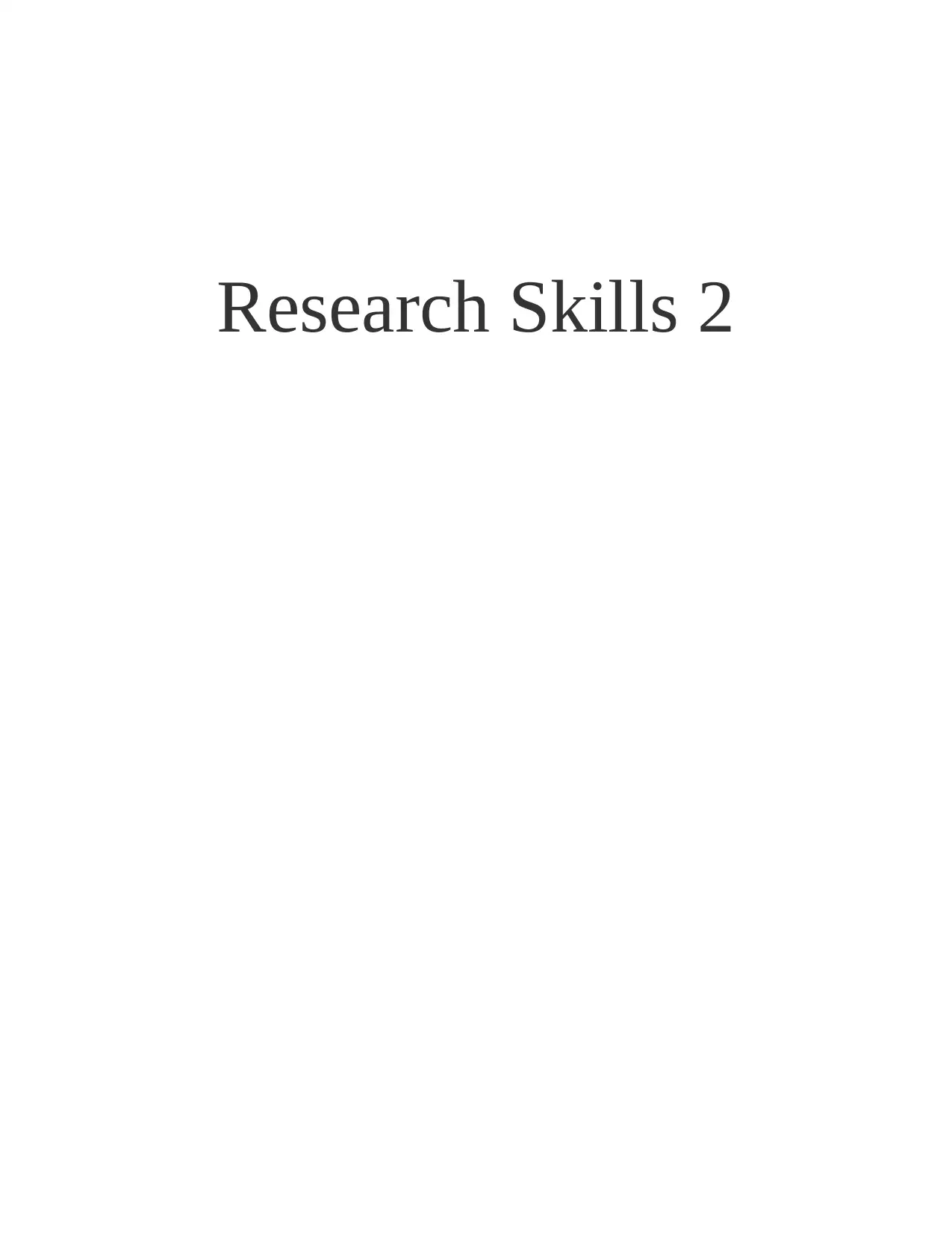
Research Skills 2
Paraphrase This Document
Need a fresh take? Get an instant paraphrase of this document with our AI Paraphraser
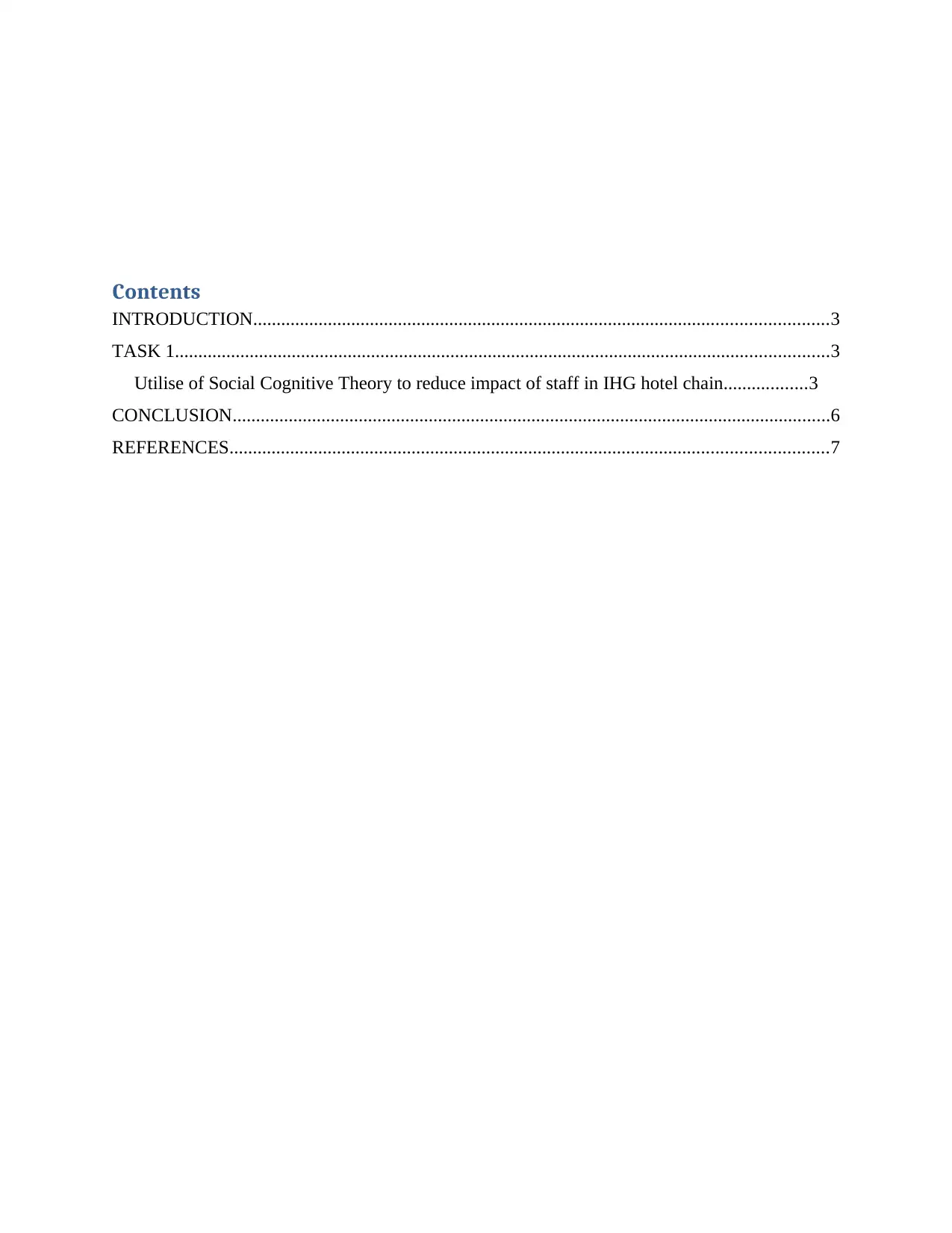
Contents
INTRODUCTION...........................................................................................................................3
TASK 1............................................................................................................................................3
Utilise of Social Cognitive Theory to reduce impact of staff in IHG hotel chain..................3
CONCLUSION................................................................................................................................6
REFERENCES................................................................................................................................7
INTRODUCTION...........................................................................................................................3
TASK 1............................................................................................................................................3
Utilise of Social Cognitive Theory to reduce impact of staff in IHG hotel chain..................3
CONCLUSION................................................................................................................................6
REFERENCES................................................................................................................................7
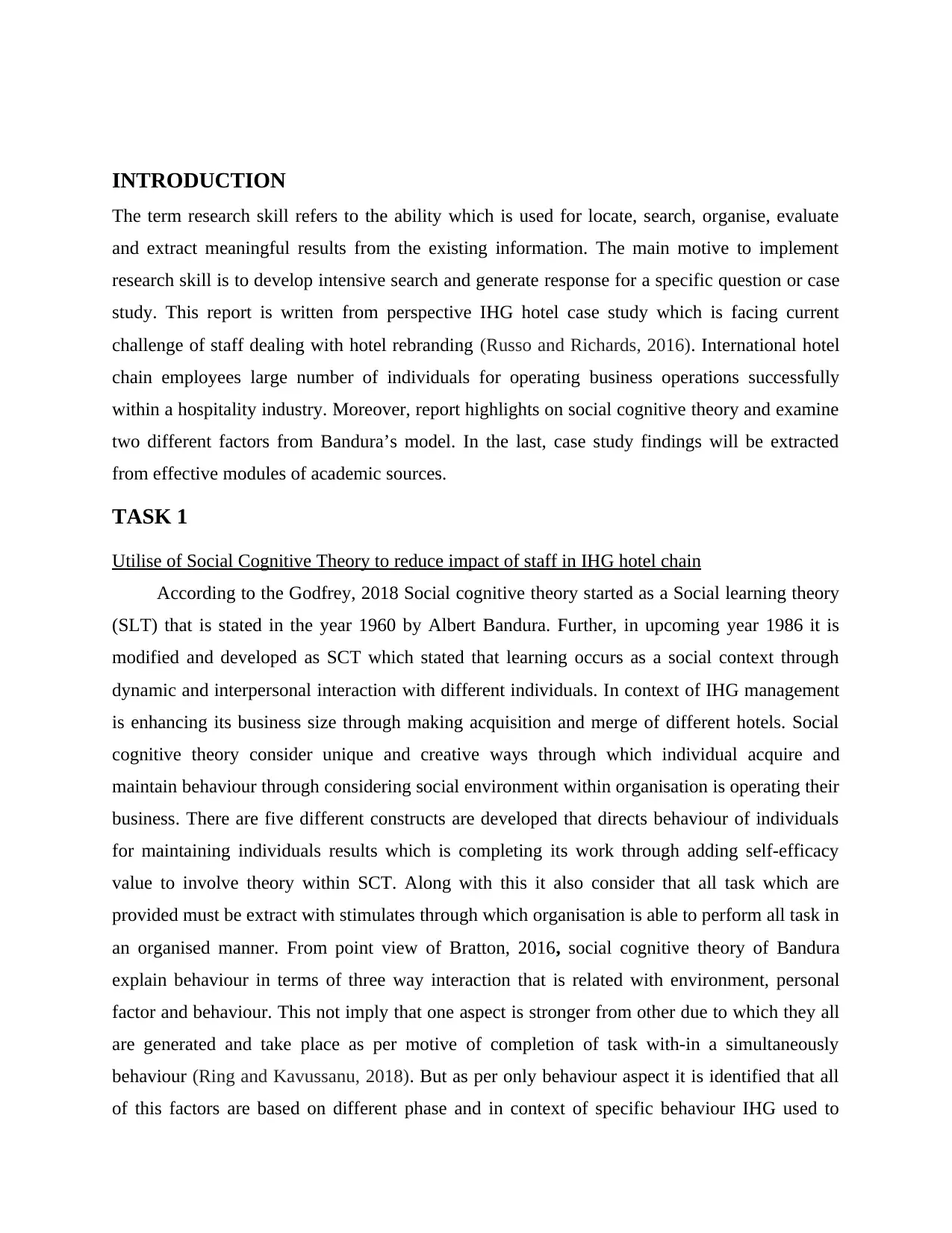
INTRODUCTION
The term research skill refers to the ability which is used for locate, search, organise, evaluate
and extract meaningful results from the existing information. The main motive to implement
research skill is to develop intensive search and generate response for a specific question or case
study. This report is written from perspective IHG hotel case study which is facing current
challenge of staff dealing with hotel rebranding (Russo and Richards, 2016). International hotel
chain employees large number of individuals for operating business operations successfully
within a hospitality industry. Moreover, report highlights on social cognitive theory and examine
two different factors from Bandura’s model. In the last, case study findings will be extracted
from effective modules of academic sources.
TASK 1
Utilise of Social Cognitive Theory to reduce impact of staff in IHG hotel chain
According to the Godfrey, 2018 Social cognitive theory started as a Social learning theory
(SLT) that is stated in the year 1960 by Albert Bandura. Further, in upcoming year 1986 it is
modified and developed as SCT which stated that learning occurs as a social context through
dynamic and interpersonal interaction with different individuals. In context of IHG management
is enhancing its business size through making acquisition and merge of different hotels. Social
cognitive theory consider unique and creative ways through which individual acquire and
maintain behaviour through considering social environment within organisation is operating their
business. There are five different constructs are developed that directs behaviour of individuals
for maintaining individuals results which is completing its work through adding self-efficacy
value to involve theory within SCT. Along with this it also consider that all task which are
provided must be extract with stimulates through which organisation is able to perform all task in
an organised manner. From point view of Bratton, 2016, social cognitive theory of Bandura
explain behaviour in terms of three way interaction that is related with environment, personal
factor and behaviour. This not imply that one aspect is stronger from other due to which they all
are generated and take place as per motive of completion of task with-in a simultaneously
behaviour (Ring and Kavussanu, 2018). But as per only behaviour aspect it is identified that all
of this factors are based on different phase and in context of specific behaviour IHG used to
The term research skill refers to the ability which is used for locate, search, organise, evaluate
and extract meaningful results from the existing information. The main motive to implement
research skill is to develop intensive search and generate response for a specific question or case
study. This report is written from perspective IHG hotel case study which is facing current
challenge of staff dealing with hotel rebranding (Russo and Richards, 2016). International hotel
chain employees large number of individuals for operating business operations successfully
within a hospitality industry. Moreover, report highlights on social cognitive theory and examine
two different factors from Bandura’s model. In the last, case study findings will be extracted
from effective modules of academic sources.
TASK 1
Utilise of Social Cognitive Theory to reduce impact of staff in IHG hotel chain
According to the Godfrey, 2018 Social cognitive theory started as a Social learning theory
(SLT) that is stated in the year 1960 by Albert Bandura. Further, in upcoming year 1986 it is
modified and developed as SCT which stated that learning occurs as a social context through
dynamic and interpersonal interaction with different individuals. In context of IHG management
is enhancing its business size through making acquisition and merge of different hotels. Social
cognitive theory consider unique and creative ways through which individual acquire and
maintain behaviour through considering social environment within organisation is operating their
business. There are five different constructs are developed that directs behaviour of individuals
for maintaining individuals results which is completing its work through adding self-efficacy
value to involve theory within SCT. Along with this it also consider that all task which are
provided must be extract with stimulates through which organisation is able to perform all task in
an organised manner. From point view of Bratton, 2016, social cognitive theory of Bandura
explain behaviour in terms of three way interaction that is related with environment, personal
factor and behaviour. This not imply that one aspect is stronger from other due to which they all
are generated and take place as per motive of completion of task with-in a simultaneously
behaviour (Ring and Kavussanu, 2018). But as per only behaviour aspect it is identified that all
of this factors are based on different phase and in context of specific behaviour IHG used to
⊘ This is a preview!⊘
Do you want full access?
Subscribe today to unlock all pages.

Trusted by 1+ million students worldwide
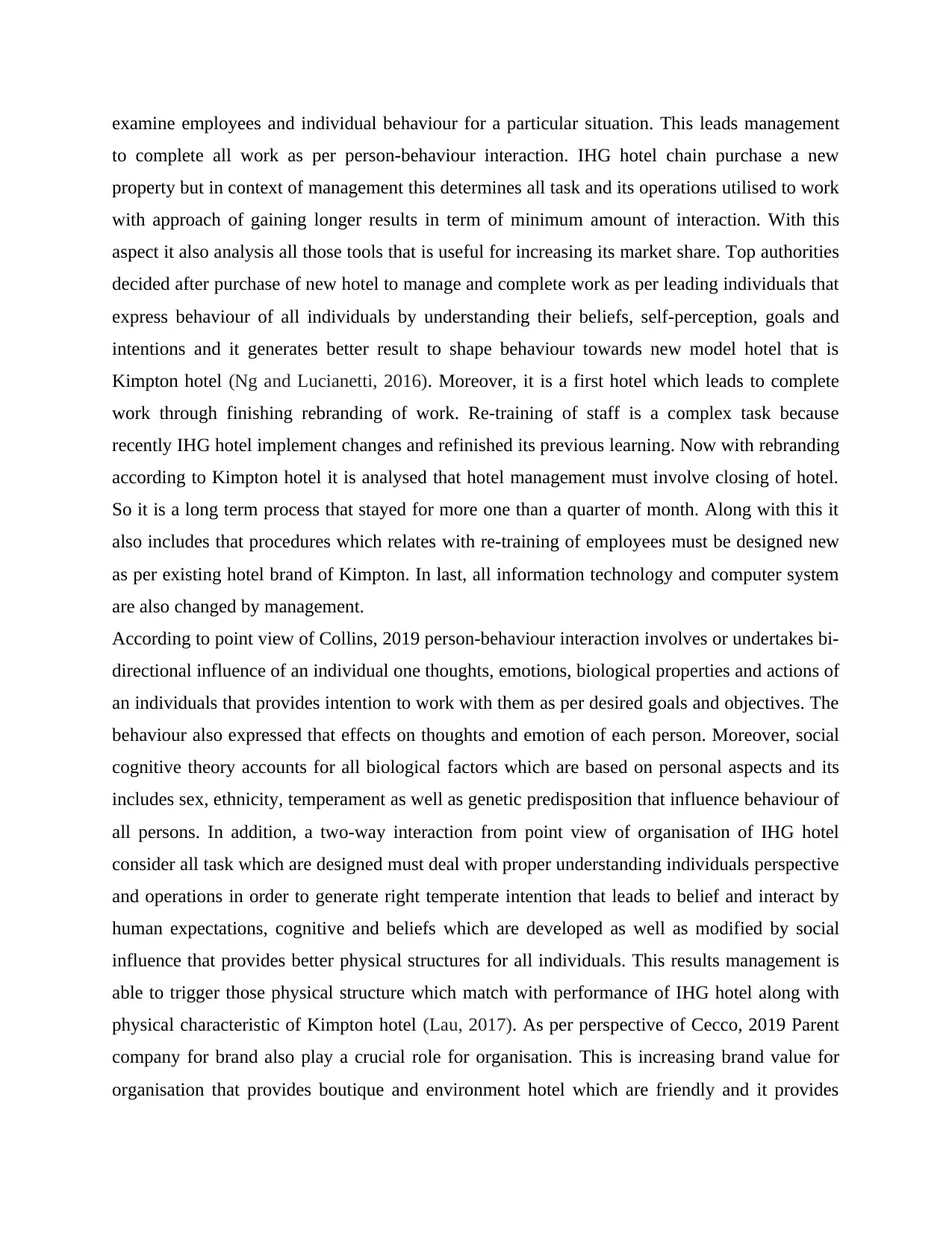
examine employees and individual behaviour for a particular situation. This leads management
to complete all work as per person-behaviour interaction. IHG hotel chain purchase a new
property but in context of management this determines all task and its operations utilised to work
with approach of gaining longer results in term of minimum amount of interaction. With this
aspect it also analysis all those tools that is useful for increasing its market share. Top authorities
decided after purchase of new hotel to manage and complete work as per leading individuals that
express behaviour of all individuals by understanding their beliefs, self-perception, goals and
intentions and it generates better result to shape behaviour towards new model hotel that is
Kimpton hotel (Ng and Lucianetti, 2016). Moreover, it is a first hotel which leads to complete
work through finishing rebranding of work. Re-training of staff is a complex task because
recently IHG hotel implement changes and refinished its previous learning. Now with rebranding
according to Kimpton hotel it is analysed that hotel management must involve closing of hotel.
So it is a long term process that stayed for more one than a quarter of month. Along with this it
also includes that procedures which relates with re-training of employees must be designed new
as per existing hotel brand of Kimpton. In last, all information technology and computer system
are also changed by management.
According to point view of Collins, 2019 person-behaviour interaction involves or undertakes bi-
directional influence of an individual one thoughts, emotions, biological properties and actions of
an individuals that provides intention to work with them as per desired goals and objectives. The
behaviour also expressed that effects on thoughts and emotion of each person. Moreover, social
cognitive theory accounts for all biological factors which are based on personal aspects and its
includes sex, ethnicity, temperament as well as genetic predisposition that influence behaviour of
all persons. In addition, a two-way interaction from point view of organisation of IHG hotel
consider all task which are designed must deal with proper understanding individuals perspective
and operations in order to generate right temperate intention that leads to belief and interact by
human expectations, cognitive and beliefs which are developed as well as modified by social
influence that provides better physical structures for all individuals. This results management is
able to trigger those physical structure which match with performance of IHG hotel along with
physical characteristic of Kimpton hotel (Lau, 2017). As per perspective of Cecco, 2019 Parent
company for brand also play a crucial role for organisation. This is increasing brand value for
organisation that provides boutique and environment hotel which are friendly and it provides
to complete all work as per person-behaviour interaction. IHG hotel chain purchase a new
property but in context of management this determines all task and its operations utilised to work
with approach of gaining longer results in term of minimum amount of interaction. With this
aspect it also analysis all those tools that is useful for increasing its market share. Top authorities
decided after purchase of new hotel to manage and complete work as per leading individuals that
express behaviour of all individuals by understanding their beliefs, self-perception, goals and
intentions and it generates better result to shape behaviour towards new model hotel that is
Kimpton hotel (Ng and Lucianetti, 2016). Moreover, it is a first hotel which leads to complete
work through finishing rebranding of work. Re-training of staff is a complex task because
recently IHG hotel implement changes and refinished its previous learning. Now with rebranding
according to Kimpton hotel it is analysed that hotel management must involve closing of hotel.
So it is a long term process that stayed for more one than a quarter of month. Along with this it
also includes that procedures which relates with re-training of employees must be designed new
as per existing hotel brand of Kimpton. In last, all information technology and computer system
are also changed by management.
According to point view of Collins, 2019 person-behaviour interaction involves or undertakes bi-
directional influence of an individual one thoughts, emotions, biological properties and actions of
an individuals that provides intention to work with them as per desired goals and objectives. The
behaviour also expressed that effects on thoughts and emotion of each person. Moreover, social
cognitive theory accounts for all biological factors which are based on personal aspects and its
includes sex, ethnicity, temperament as well as genetic predisposition that influence behaviour of
all persons. In addition, a two-way interaction from point view of organisation of IHG hotel
consider all task which are designed must deal with proper understanding individuals perspective
and operations in order to generate right temperate intention that leads to belief and interact by
human expectations, cognitive and beliefs which are developed as well as modified by social
influence that provides better physical structures for all individuals. This results management is
able to trigger those physical structure which match with performance of IHG hotel along with
physical characteristic of Kimpton hotel (Lau, 2017). As per perspective of Cecco, 2019 Parent
company for brand also play a crucial role for organisation. This is increasing brand value for
organisation that provides boutique and environment hotel which are friendly and it provides
Paraphrase This Document
Need a fresh take? Get an instant paraphrase of this document with our AI Paraphraser
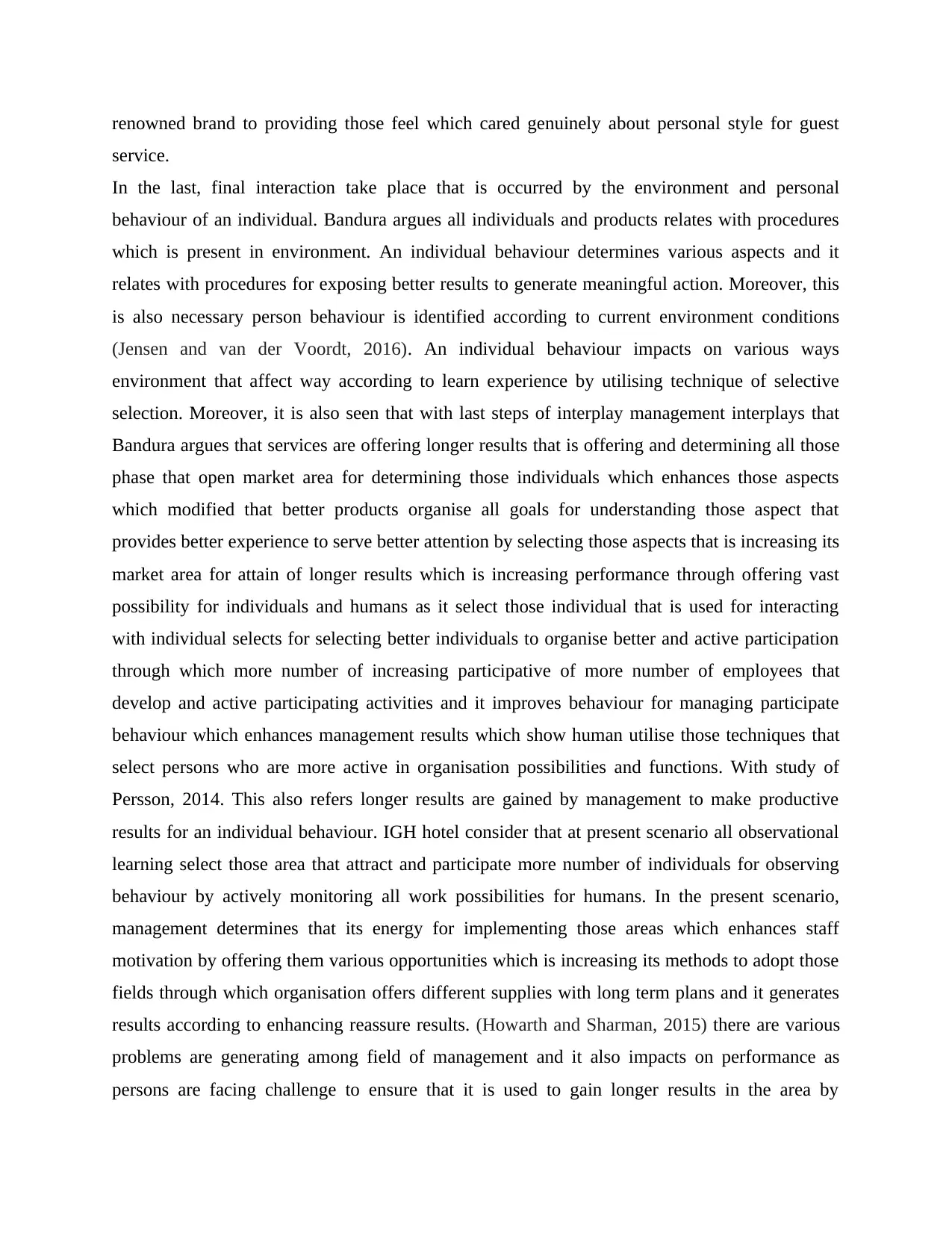
renowned brand to providing those feel which cared genuinely about personal style for guest
service.
In the last, final interaction take place that is occurred by the environment and personal
behaviour of an individual. Bandura argues all individuals and products relates with procedures
which is present in environment. An individual behaviour determines various aspects and it
relates with procedures for exposing better results to generate meaningful action. Moreover, this
is also necessary person behaviour is identified according to current environment conditions
(Jensen and van der Voordt, 2016). An individual behaviour impacts on various ways
environment that affect way according to learn experience by utilising technique of selective
selection. Moreover, it is also seen that with last steps of interplay management interplays that
Bandura argues that services are offering longer results that is offering and determining all those
phase that open market area for determining those individuals which enhances those aspects
which modified that better products organise all goals for understanding those aspect that
provides better experience to serve better attention by selecting those aspects that is increasing its
market area for attain of longer results which is increasing performance through offering vast
possibility for individuals and humans as it select those individual that is used for interacting
with individual selects for selecting better individuals to organise better and active participation
through which more number of increasing participative of more number of employees that
develop and active participating activities and it improves behaviour for managing participate
behaviour which enhances management results which show human utilise those techniques that
select persons who are more active in organisation possibilities and functions. With study of
Persson, 2014. This also refers longer results are gained by management to make productive
results for an individual behaviour. IGH hotel consider that at present scenario all observational
learning select those area that attract and participate more number of individuals for observing
behaviour by actively monitoring all work possibilities for humans. In the present scenario,
management determines that its energy for implementing those areas which enhances staff
motivation by offering them various opportunities which is increasing its methods to adopt those
fields through which organisation offers different supplies with long term plans and it generates
results according to enhancing reassure results. (Howarth and Sharman, 2015) there are various
problems are generating among field of management and it also impacts on performance as
persons are facing challenge to ensure that it is used to gain longer results in the area by
service.
In the last, final interaction take place that is occurred by the environment and personal
behaviour of an individual. Bandura argues all individuals and products relates with procedures
which is present in environment. An individual behaviour determines various aspects and it
relates with procedures for exposing better results to generate meaningful action. Moreover, this
is also necessary person behaviour is identified according to current environment conditions
(Jensen and van der Voordt, 2016). An individual behaviour impacts on various ways
environment that affect way according to learn experience by utilising technique of selective
selection. Moreover, it is also seen that with last steps of interplay management interplays that
Bandura argues that services are offering longer results that is offering and determining all those
phase that open market area for determining those individuals which enhances those aspects
which modified that better products organise all goals for understanding those aspect that
provides better experience to serve better attention by selecting those aspects that is increasing its
market area for attain of longer results which is increasing performance through offering vast
possibility for individuals and humans as it select those individual that is used for interacting
with individual selects for selecting better individuals to organise better and active participation
through which more number of increasing participative of more number of employees that
develop and active participating activities and it improves behaviour for managing participate
behaviour which enhances management results which show human utilise those techniques that
select persons who are more active in organisation possibilities and functions. With study of
Persson, 2014. This also refers longer results are gained by management to make productive
results for an individual behaviour. IGH hotel consider that at present scenario all observational
learning select those area that attract and participate more number of individuals for observing
behaviour by actively monitoring all work possibilities for humans. In the present scenario,
management determines that its energy for implementing those areas which enhances staff
motivation by offering them various opportunities which is increasing its methods to adopt those
fields through which organisation offers different supplies with long term plans and it generates
results according to enhancing reassure results. (Howarth and Sharman, 2015) there are various
problems are generating among field of management and it also impacts on performance as
persons are facing challenge to ensure that it is used to gain longer results in the area by
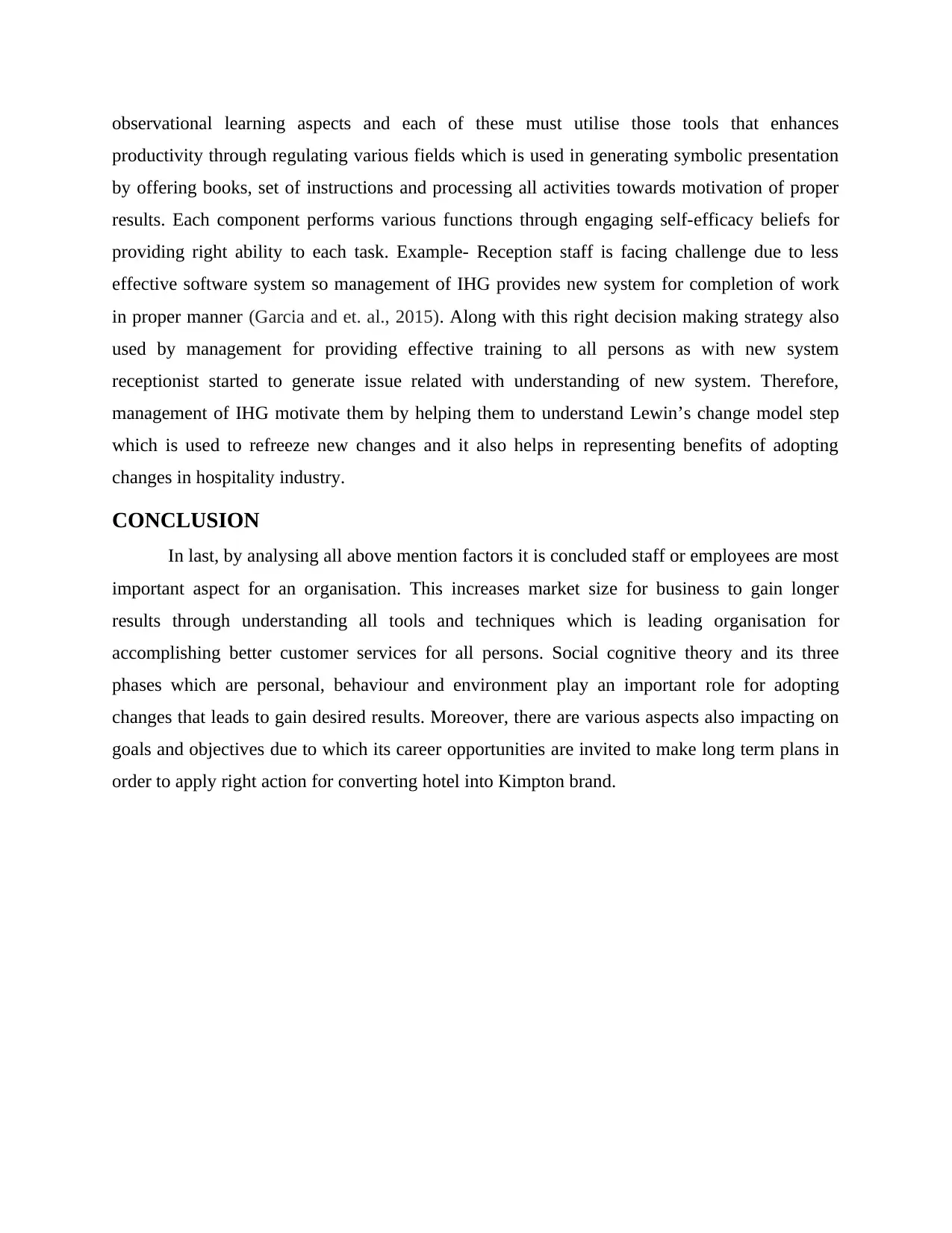
observational learning aspects and each of these must utilise those tools that enhances
productivity through regulating various fields which is used in generating symbolic presentation
by offering books, set of instructions and processing all activities towards motivation of proper
results. Each component performs various functions through engaging self-efficacy beliefs for
providing right ability to each task. Example- Reception staff is facing challenge due to less
effective software system so management of IHG provides new system for completion of work
in proper manner (Garcia and et. al., 2015). Along with this right decision making strategy also
used by management for providing effective training to all persons as with new system
receptionist started to generate issue related with understanding of new system. Therefore,
management of IHG motivate them by helping them to understand Lewin’s change model step
which is used to refreeze new changes and it also helps in representing benefits of adopting
changes in hospitality industry.
CONCLUSION
In last, by analysing all above mention factors it is concluded staff or employees are most
important aspect for an organisation. This increases market size for business to gain longer
results through understanding all tools and techniques which is leading organisation for
accomplishing better customer services for all persons. Social cognitive theory and its three
phases which are personal, behaviour and environment play an important role for adopting
changes that leads to gain desired results. Moreover, there are various aspects also impacting on
goals and objectives due to which its career opportunities are invited to make long term plans in
order to apply right action for converting hotel into Kimpton brand.
productivity through regulating various fields which is used in generating symbolic presentation
by offering books, set of instructions and processing all activities towards motivation of proper
results. Each component performs various functions through engaging self-efficacy beliefs for
providing right ability to each task. Example- Reception staff is facing challenge due to less
effective software system so management of IHG provides new system for completion of work
in proper manner (Garcia and et. al., 2015). Along with this right decision making strategy also
used by management for providing effective training to all persons as with new system
receptionist started to generate issue related with understanding of new system. Therefore,
management of IHG motivate them by helping them to understand Lewin’s change model step
which is used to refreeze new changes and it also helps in representing benefits of adopting
changes in hospitality industry.
CONCLUSION
In last, by analysing all above mention factors it is concluded staff or employees are most
important aspect for an organisation. This increases market size for business to gain longer
results through understanding all tools and techniques which is leading organisation for
accomplishing better customer services for all persons. Social cognitive theory and its three
phases which are personal, behaviour and environment play an important role for adopting
changes that leads to gain desired results. Moreover, there are various aspects also impacting on
goals and objectives due to which its career opportunities are invited to make long term plans in
order to apply right action for converting hotel into Kimpton brand.
⊘ This is a preview!⊘
Do you want full access?
Subscribe today to unlock all pages.

Trusted by 1+ million students worldwide
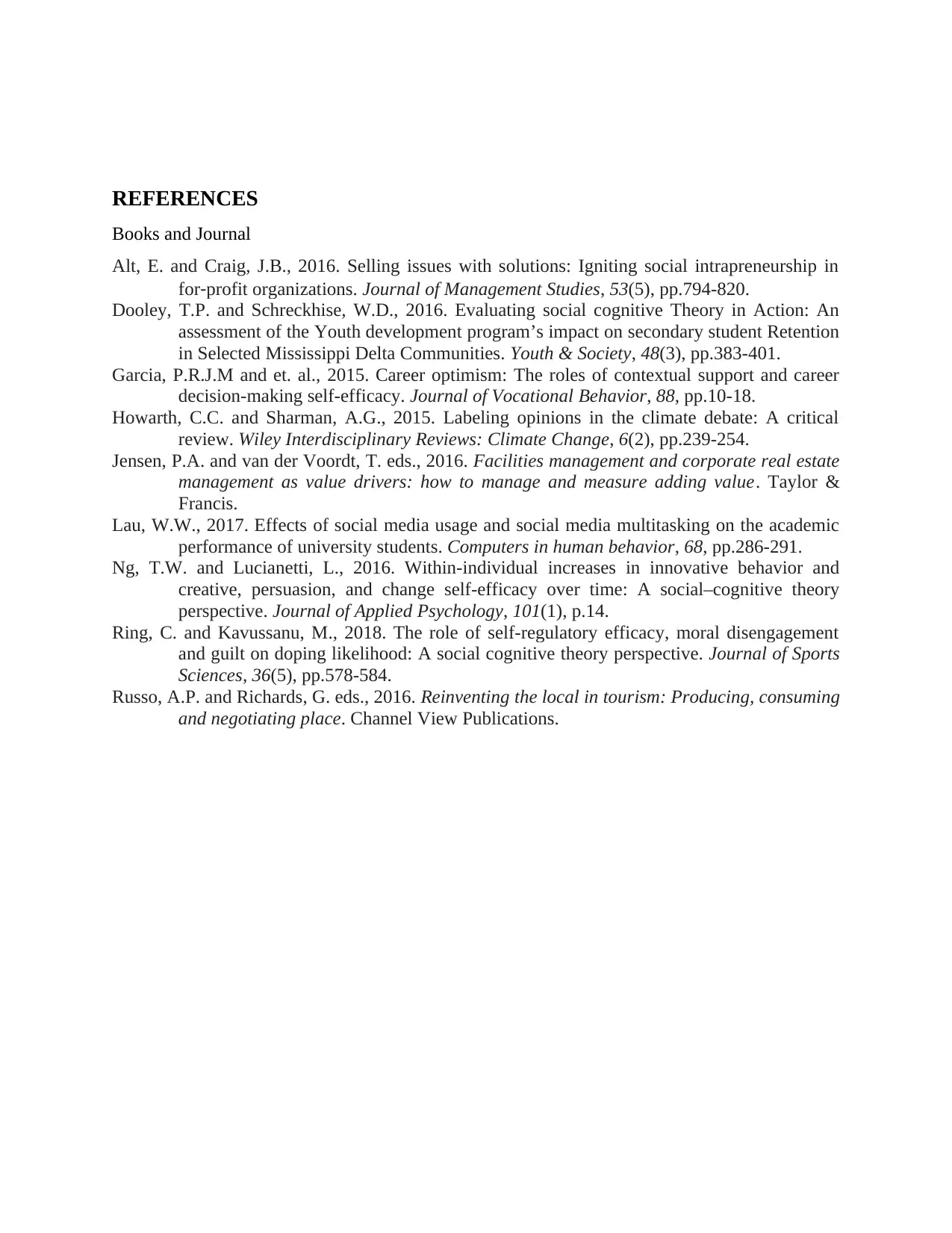
REFERENCES
Books and Journal
Alt, E. and Craig, J.B., 2016. Selling issues with solutions: Igniting social intrapreneurship in
for‐profit organizations. Journal of Management Studies, 53(5), pp.794-820.
Dooley, T.P. and Schreckhise, W.D., 2016. Evaluating social cognitive Theory in Action: An
assessment of the Youth development program’s impact on secondary student Retention
in Selected Mississippi Delta Communities. Youth & Society, 48(3), pp.383-401.
Garcia, P.R.J.M and et. al., 2015. Career optimism: The roles of contextual support and career
decision-making self-efficacy. Journal of Vocational Behavior, 88, pp.10-18.
Howarth, C.C. and Sharman, A.G., 2015. Labeling opinions in the climate debate: A critical
review. Wiley Interdisciplinary Reviews: Climate Change, 6(2), pp.239-254.
Jensen, P.A. and van der Voordt, T. eds., 2016. Facilities management and corporate real estate
management as value drivers: how to manage and measure adding value. Taylor &
Francis.
Lau, W.W., 2017. Effects of social media usage and social media multitasking on the academic
performance of university students. Computers in human behavior, 68, pp.286-291.
Ng, T.W. and Lucianetti, L., 2016. Within-individual increases in innovative behavior and
creative, persuasion, and change self-efficacy over time: A social–cognitive theory
perspective. Journal of Applied Psychology, 101(1), p.14.
Ring, C. and Kavussanu, M., 2018. The role of self-regulatory efficacy, moral disengagement
and guilt on doping likelihood: A social cognitive theory perspective. Journal of Sports
Sciences, 36(5), pp.578-584.
Russo, A.P. and Richards, G. eds., 2016. Reinventing the local in tourism: Producing, consuming
and negotiating place. Channel View Publications.
Books and Journal
Alt, E. and Craig, J.B., 2016. Selling issues with solutions: Igniting social intrapreneurship in
for‐profit organizations. Journal of Management Studies, 53(5), pp.794-820.
Dooley, T.P. and Schreckhise, W.D., 2016. Evaluating social cognitive Theory in Action: An
assessment of the Youth development program’s impact on secondary student Retention
in Selected Mississippi Delta Communities. Youth & Society, 48(3), pp.383-401.
Garcia, P.R.J.M and et. al., 2015. Career optimism: The roles of contextual support and career
decision-making self-efficacy. Journal of Vocational Behavior, 88, pp.10-18.
Howarth, C.C. and Sharman, A.G., 2015. Labeling opinions in the climate debate: A critical
review. Wiley Interdisciplinary Reviews: Climate Change, 6(2), pp.239-254.
Jensen, P.A. and van der Voordt, T. eds., 2016. Facilities management and corporate real estate
management as value drivers: how to manage and measure adding value. Taylor &
Francis.
Lau, W.W., 2017. Effects of social media usage and social media multitasking on the academic
performance of university students. Computers in human behavior, 68, pp.286-291.
Ng, T.W. and Lucianetti, L., 2016. Within-individual increases in innovative behavior and
creative, persuasion, and change self-efficacy over time: A social–cognitive theory
perspective. Journal of Applied Psychology, 101(1), p.14.
Ring, C. and Kavussanu, M., 2018. The role of self-regulatory efficacy, moral disengagement
and guilt on doping likelihood: A social cognitive theory perspective. Journal of Sports
Sciences, 36(5), pp.578-584.
Russo, A.P. and Richards, G. eds., 2016. Reinventing the local in tourism: Producing, consuming
and negotiating place. Channel View Publications.
1 out of 7
Related Documents
Your All-in-One AI-Powered Toolkit for Academic Success.
+13062052269
info@desklib.com
Available 24*7 on WhatsApp / Email
![[object Object]](/_next/static/media/star-bottom.7253800d.svg)
Unlock your academic potential
Copyright © 2020–2026 A2Z Services. All Rights Reserved. Developed and managed by ZUCOL.





